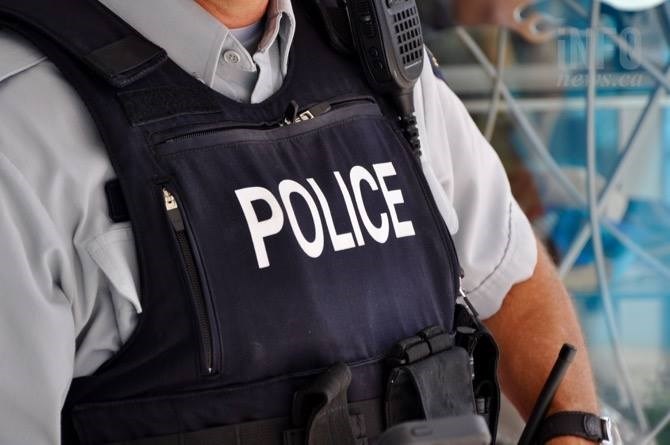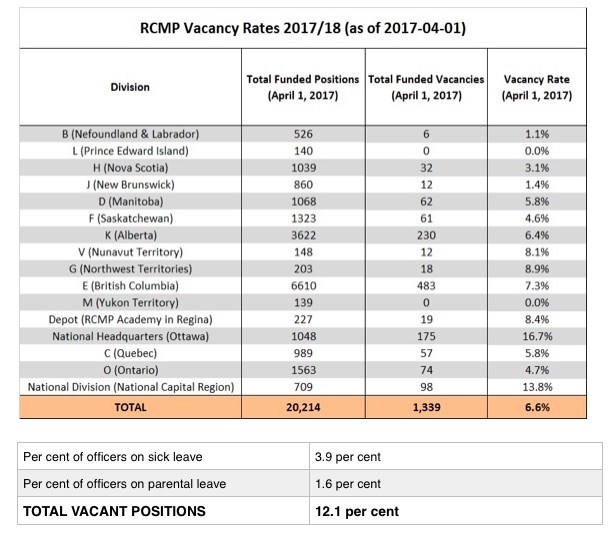
(JOHN MCDONALD / iNFOnews.ca)
December 01, 2017 - 4:30 PM
VERNON - Vernon is ready to pay for more police officers, but how long it will take to get them is another matter.
Vernon, and other Interior communities, are putting in requests for more officers as the RCMP is already hustling to fill hundreds of empty positions across the country.
The force has roughly 1,339 vacancies within its organization, or 6.6 per cent of its 20,214 funded positions, according to figures released to iNFOnews.ca by RCMP in Ottawa. And that doesn’t include the number of officers who are away on long term sick leave or parental leave, which the RCMP doesn’t fully backfill.
On average, the number of members away on sick leave of more than a month was 727, according to the data we received this week, which was dated April 1, 2017. The number of people away on maternity or paternity leave accounted for another 294 positions. According to Staff Sgt. Tania Vaughan, efforts are made to cover these vacancies “when circumstances dictate” using resources such as relief members, reservists, or bringing in members on temporary deployments, but positions are not backfilled on a permanent basis if the officer is coming back.
Altogether, it means that roughly 12 per cent of RCMP positions are currently empty.

Original table provided by RCMP, amended by iNFOnews.ca to include percentages of vacancies for sick leave and parental leave.
Image Credit: RCMP
Those vacancies can have a big impact on frontline officers. In our series last year "Risk it Out" we looked at issues of burnout, safety, and reduced service levels related to RCMP understaffing. The officers themselves can't go public with their concerns because they would be exposed to disciplinary action.
“WE’RE HIRING!”
There are simply not enough police officers to go around.
In Vernon, for example, the City reduced its number of funded positions back in 2013 because the detachment was having trouble simply maintaining numbers. A city official said at the time there was a lot of pressure on Depot, Canada’s RCMP academy, to train and fill vacant positions across the country. That remains true today. The funding in Vernon was bumped back up to 50 in 2016, and this year, a further increase was approved for six more officers. The question is, how long will it take before boots hit the ground? The Vernon RCMP provided no specific time estimate.
"While we are all eager for these new resources to arrive in Vernon, the process to increase staffing does take some time," spokesperson Const. Kelly Brett says in an email. "Once the Province of British Columbia has endorsed the recommendation and the government of Canada approves the request, RCMP staffing will work to fulfill the increase in resources."
Const. Brett says the RCMP is pleased with the City's support for the additional resources, which will allow police officers to "spend more time engaged in proactive policing initiatives across the City of Vernon."
We know other municipalities have had to wait many months for officers to arrive. Take Kamloops, for example. The City approved an increase of ten officers in May 2015, bringing the compliment up to 130. In December 2016, however, the detachment was still only billing for 120 officers because it had not seen the full arrival of bodies and still nothing has changed. Kamloops RCMP Supt. Brad Mueller says as of the end of October, the detachment was billing for 120.5 officers.
Retired Mountie Rob Creasser, who advocates on behalf of current serving members unable to speak out for fear of disciplinary action, says even when funding is allotted, “there’s no guarantee you’re going to get the bodies.”
“The RCMP is having difficulty attracting people through the front door,” Creasser says.
The main reason, he says, is that wages are typically below what other police forces pay and don’t come with comparable benefits. He also points out that sexual harassment issues and low staffing levels have not contributed to a positive working environment.
“The RCMP has a lot of work as an institution and an employer to attract people,” he says.
Earlier this month, the RCMP put out a news release letting people know it’s hiring for about 1,200 positions. Those will come from the RCMP training academy in Regina, where Sgt. Vaughan says they are working to bolster the number of cadets.
“Due to the RCMP's continued ramp-up efforts in recruiting, in fiscal year 2016/17, the RCMP enrolled 1,088 cadets to Depot, a significant increase (175 per cent) since 2012/13 when 395 cadets were enrolled,” Vaughan says. “We continue to review and adjust our strategies and tactics to improve our ability to remain competitive without compromising the quality of our applicants.”
About 1,152 cadets are forecast this year increasing to 1,280 cadets in 2018-2019, she says.
“A targeted approach to recruiting, advertising and marketing is being used to assist in positioning the RCMP as the employer of choice, specifically, to those who may not have considered a career in policing,” Vaughan says.
It should be noted that in 2016-2017, just over 800 officers left the RCMP for retirement or other reasons. The RCMP also has to compete with municipal police forces for recruits.
“RCMP recruiters develop partnerships and work with a variety of cultural and community groups across Canada to raise awareness of a career in policing,” Vaughan says. “Recruiters lead, deliver and participate in a variety of recruiting events, such as women’s and diversity forums, targeted (Physical Abilities Requirement Evaluation) sessions, targeted information sessions, and career presentations. These venues allow recruiters to speak directly to interested people and to answer questions and dispel myths related to applying and joining the RCMP.”
She also highlighted an enhanced Disability Management and Accommodation Program that was introduced on April 1, 2017, for all members.
“The program is designed to maintain a member's connection to the workplace and reinforces their ability to remain at or return to work following an illness or injury and mitigate any barriers to doing so,” she says.
RCMP UNION
The RCMP currently has no union, but that could be changing soon. Efforts escalated this year with initiatives like the “No-Stripe Campaign” where Mounties protested over a lack of human resources, rising detachment attrition rates with no plan to improve or increase recruitment, inconsistent and prosecutorial use of the disciplinary process, and excessive use of overtime.
Creasser is hopeful that once they get union certification, there will be more freedom for officers to speak out about the challenges they face.
“There is soon going to be a group certified to represent frontline RCMP officers who will tell a much more brutal story about resourcing than what managers have talked about,” Creasser says. “The fact is that communities, without knowing how severely understaffed the RCMP has been, are now going to hear it from the people actually doing the job.”
To contact a reporter for this story, email Charlotte Helston or call 250-309-5230 or email the editor. You can also submit photos, videos or news tips to the newsroom and be entered to win a monthly prize draw.
We welcome your comments and opinions on our stories but play nice. We won't censor or delete comments unless they contain off-topic statements or links, unnecessary vulgarity, false facts, spam or obviously fake profiles. If you have any concerns about what you see in comments, email the editor in the link above.
News from © iNFOnews, 2017